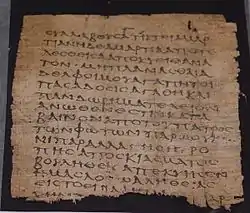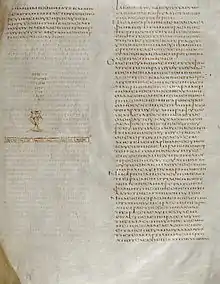James 1
James 1 is the first chapter of the Epistle of James in the New Testament of the Christian Bible. The author identifies himself as "James, a servant of God and of the Lord Jesus Christ" and the epistle is traditionally attributed to James the brother of Jesus, written in Jerusalem between 48–61 CE. Alternatively, some scholars argue that it is a pseudographical work written after 61 CE.[1][2][3]
| James 1 | |
|---|---|
 Epistle of James 1:15-18 on the verso side of Papyrus 23, from ca. AD 250. | |
| Book | Epistle of James |
| Category | General epistles |
| Christian Bible part | New Testament |
| Order in the Christian part | 20 |
This chapter contains the letter prescript, an exposition about the joy in temptations, related to three connected actions: hearing, speaking and doing.[4]
Text and interpretation

The original text was written in Koine Greek.[5] This chapter is divided into 27 verses.
Verse 1
James, a servant of God and of the Lord Jesus Christ, to the twelve tribes which are scattered abroad, greeting.[6]
"James": identified by early church leaders (Eusebius, Origen, etc.) to be James the Just (the brother of Jesus) (Mark 6:3), who was a distinguished leader of the first-century church in Jerusalem (Acts 12:17; 15:13; 21:18).[7] He was the oldest of the four brothers of Jesus born to Mary and Joseph (Matthew 13:55; Mark 6:3); a non-believer of Jesus as Christ until after the resurrection (Acts 1:14), perhaps as a result of a special post-resurrection appearance of Jesus to him (1 Corinthians 15:7).[7]
"Servant": is 'a title of authority' (cf. Nehemiah 9:14; Psalm 89:3; Romans 1:1; Philippians 1:1).[8] Bauckham suggests that James does not state his family relationship to Jesus because he does not see it as a basis for authority (cf. Mark 3:33–35).[8]
Verse 4
But let patience have its perfect work, that you may be perfect and complete, lacking nothing.[9]
"Perfect" (Greek: teleios; used two times here) and "complete" point to the theme of "maturity".[10]
Verse 5
If any of you lacks wisdom, let him ask of God, who gives to all liberally and without reproach, and it will be given to him.[11]
"Wisdom" can be rendered as "skill for living", not 'primarily knowledge', but 'godly behavior in difficult situations' (cf. James 3:15).[10]
Verse 12
Blessed is the man who endures temptation; for when he has been approved, he will receive the crown of life which the Lord has promised to those who love Him.[12]
"Blessed" here is in the sense of "to be richly rewarded by God" both in the current world (after character development in 1:4), and the next (Matthew 5:11–12).[10]
Verse 13
Let no one say when he is tempted, "I am tempted by God"; for God cannot be tempted by evil, nor does He Himself tempt anyone.[13]
"Tempted": different from the previous use, as 'exercising grace' in relation to joy and boasting, here the "temptations" are the 'issue of shame and death', that is 'to be watched against'.[14]
"Tempted by God" (NKJV; KJV: "Tempted of God"): A holy God without iniquity does not delight in sin, being contrary to his nature and perfection, so he will not tempt another to sin.[14] Sinful men often charge God for their sins, or temptations to sin, similar to Adam, when fallen (Genesis 3:12) who, to excuse himself, lays the blame to Eve ("the woman"), and ultimately to God, who gave her to him; suggesting that if it had not been for the woman (had God not given him the woman to be with him), he should not have eaten of the forbidden fruit, nor should he have had any temptation to it, and therefore it was God's fault.[14] "God cannot be tempted with evil" or "evils": the Israelites tempted God at Massah and Meribah, with their murmuring, distrust and unbelief, poking God's patience and his power; and Jesus has been tempted by evil men, and by evil things, but he cannot be tempted "to evil" (as rendered in the Ethiopian version), nor can he be tempted by anything in himself, who is pure and holy, or by anything, to do any sinful action:[14]
"Nor does He Himself tempt anyone": that is, 'to sin'.[14] God tempted Abraham, to try his faith, love, and obedience to God; he tempted the Israelites in the wilderness, to humble them, and prove what was in their hearts; and he tempted Job, and tried his faith and patience; and so God 'tempts and tries' his righteous people, by afflictions, more or less: but he never tempts or solicits them to sin; temptations to sin come from another direction.[14]
Verse 27
Religion that God our Father accepts as pure and faultless is this: to look after orphans and widows in their distress and to keep oneself from being polluted by the world.[15]
"Keep oneself from being polluted by the world": in the sense of not looking for security or advancement in the things valued by the people in the world, such as 'no need to hold on to money', so Christians can be give freely and generously.[16]
Textual witnesses
Some early manuscripts containing the text of this chapter in Greek are:
- Papyrus 23 (~AD 250; extant verses 10-12, 15-18)[17]
- Codex Vaticanus (325-350)[17]
- Codex Sinaiticus (330-360)[17]
- Codex Alexandrinus (400-440)
- Codex Ephraemi Rescriptus (ca. 450; extant verses 3-27)
An ancient manuscript containing this chapter in the Coptic language is:
Latter Day Saint usage
James 1:5 has particular importance in the Latter Day Saint tradition. The reading of it by the young Joseph Smith is often cited as the precipitating event for the First Vision, and thus of the Restoration.[20][21][22]
David O. McKay, ninth president of The Church of Jesus Christ of Latter-day Saints, said that in "this scripture lies the secret of Joseph Smith's emergence from obscurity to world-wide renown."[23] Russell M. Nelson, the 17th and current president of the Church, has cited it stating that "Joseph Smith set a pattern for us to follow in resolving our questions."[24]
See also
References
- Riesner 2007, p. 1256.
- Davids, Peter H (1982). I Howard Marshall and W Ward Gasque (ed.). New International Greek Testament Commentary: The Epistle of James (Repr. ed.). Grand Rapids, Mich.: Eerdmans. ISBN 0802823882.
- Evans, Craig A (2005). Craig A Evans (ed.). Bible Knowledge Background Commentary: John, Hebrews-Revelation. Colorado Springs, Colo.: Victor. ISBN 0781442281.
- Riesner 2007, p. 1257.
- 20. James: Introduction, Outline, and Argument. Bible.org
- James 1:1 KJV
- Hart 2014, p. 1947.
- Bauckham 2003, p. 1484.
- James 1:4 NKJV
- Hart 2014, p. 1949.
- James 1:5 NKJV
- James 1:12 NKJV
- James 1:13 NKJV
- John Gill's Exposition of the Entire Bible - James 1:13
- James 1:27 NKJV
- Davids 1994, p. 1359.
- Riesner 2007, p. 1255.
- Aland, Kurt; Aland, Barbara (1995). The Text of the New Testament: An Introduction to the Critical Editions and to the Theory and Practice of Modern Textual Criticism. Erroll F. Rhodes (trans.). Grand Rapids: William B. Eerdmans Publishing Company. p. 96. ISBN 978-0-8028-4098-1.
- "Joseph Smith—History 1". The Pearl of Great Price. Church of Jesus Christ of Latter-day Saints. Retrieved 24 June 2019.
- Flint, B. C. "The Book of Mormon (From What about the Book of Mormon?)". Church of Christ (Temple Lot). Archived from the original on 20 April 2008. Retrieved 20 June 2019.
- "James 1:5–6". Liahona. The Church of Jesus Christ of Latter-day Saints. January 2017. Retrieved 22 June 2019.
- "Community of Christ Lessons— Children" (PDF). Community of Christ. 3 December 2017. pp. 7–8. Retrieved 22 June 2019.
- MacKay, Thomas W. (1992). "James, Epistle of". In Ludlow, Daniel H. (ed.). Encyclopedia of Mormonism. Macmillan Publishing Company. pp. 715–716. Retrieved 20 June 2019.
- Nelson, Russell M. (April 2018). "Revelation for the Church, Revelation for Our Lives". Church of Jesus Christ of Latter-day Saints. Retrieved 24 June 2019.
Sources
- Bauckham, Richard (2003). "James". In Dunn, James D. G.; Rogerson, John William (eds.). Eerdmans Commentary on the Bible (illustrated ed.). Wm. B. Eerdmans Publishing. ISBN 9780802837110.CS1 maint: ref=harv (link)
- Davids, Peter H. (1994). "James". In Carson, D. A.; France, R. T.; Motyer, J. A.; Wenham, G. J. (eds.). New Bible Commentary: 21st Century Edition (4, illustrated, reprint, revised ed.). Inter-Varsity Press. pp. 1354–1368. ISBN 9780851106489.CS1 maint: ref=harv (link)
- Hart, John F. (2014). Rydelnik, Michael; Vanlaningham, Michael (eds.). The Moody Bible Commentary. Moody Publishers. ISBN 9780802490186.CS1 maint: ref=harv (link)
- Riesner, Rainer (2007). "76. James". In Barton, John; Muddiman, John (eds.). The Oxford Bible Commentary (first (paperback) ed.). Oxford University Press. pp. 1255–1263. ISBN 978-0199277186. Retrieved February 6, 2019.CS1 maint: ref=harv (link)
External links
- James 1 King James Bible - Wikisource
- English Translation with Parallel Latin Vulgate
- Online Bible at GospelHall.org (ESV, KJV, Darby, American Standard Version, Bible in Basic English)
- Multiple bible versions at Bible Gateway (NKJV, NIV, NRSV etc.)